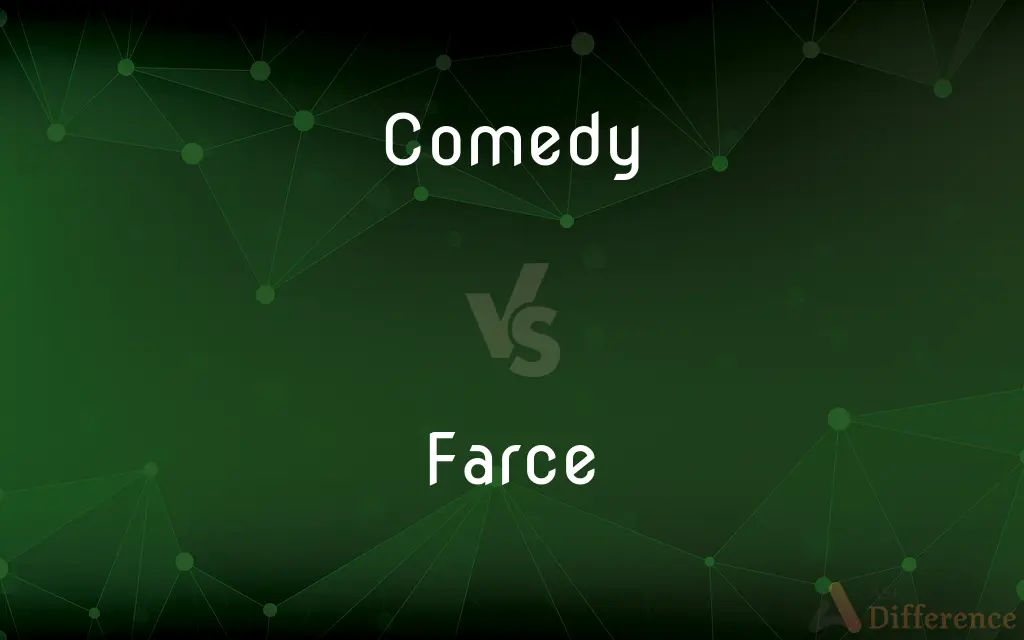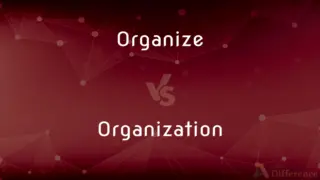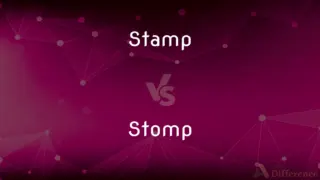Comedy vs. Farce — What's the Difference?
By Tayyaba Rehman & Fiza Rafique — Updated on February 27, 2024
Comedy is a genre of entertainment aimed at humor, often with a happy ending, whereas farce is a subset of comedy that uses exaggerated, improbable situations for laughs.

Difference Between Comedy and Farce
Table of Contents
ADVERTISEMENT
Key Differences
Comedy, a broad entertainment genre, focuses on creating laughter through situations, characters, and dialogue. It can range from subtle wit to slapstick humor, often ending on a positive note, reflecting on human nature and societal norms.
Farce, on the other hand, takes comedy to an extreme with its reliance on absurdity and highly improbable scenarios. It exaggerates characters and situations to the point of ridiculousness, aiming for non-stop laughter and often involves physical humor and mistaken identities.
Comedy can be gentle and thought-provoking, appealing to a wide audience with its varied forms, while farce seeks a more immediate, visceral reaction. Its purpose is not to provoke deep thought but to entertain through sheer absurdity and over-the-top scenarios.
Comedies often contain elements of realism, allowing the audience to relate to the characters or situations, even when exaggerated for effect. This connection can add depth to the humor and sometimes convey underlying messages or critiques.
Farces, however, prioritize rapid-fire jokes and physical comedy over character development or a believable plot. The unrealism and improbability are not only accepted but celebrated, pushing the boundaries of believability for comedic effect.
ADVERTISEMENT
Comparison Chart
Definition
A genre of entertainment focusing on humor and often featuring a happy ending.
A type of comedy that emphasizes exaggerated, improbable situations for laughs.
Key Features
Varied humor, can be subtle or overt, often with a meaningful message.
Relies on absurdity, slapstick, and exaggerated scenarios with little to no serious content.
Audience Appeal
Wide, due to its diverse forms and levels of humor.
Those appreciating slapstick, physical humor, and absurdity.
Purpose
To entertain, provoke thought, and sometimes critique society.
Primarily to entertain through over-the-top humor and situations.
Examples
Sitcoms, romantic comedies, dark comedies.
"Noises Off," "The Play That Goes Wrong," classic farces in theater.
Compare with Definitions
Comedy
A humorous play, movie, or other forms of entertainment.
Shakespeare's 'A Midsummer Night's Dream' is a classic comedy.
Farce
A comic dramatic work using buffoonery and horseplay.
The farce at the theatre had everyone in stitches.
Comedy
A professional entertainment consisting of jokes and satirical sketches.
She went to a comedy club to unwind.
Farce
A ridiculous situation or event.
The meeting devolved into a farce with no decisions made.
Comedy
A situation or event that is amusing or laughable.
The mix-up at the party turned into a comedy of errors.
Farce
Theater genre emphasizing slapstick.
He's known for his roles in farce comedies.
Comedy
Literature or drama characterized by a humorous or satirical tone.
He prefers reading comedy for its light-heartedness.
Farce
Literature that involves highly improbable scenarios.
Her latest novel is a farce that mocks corporate life.
Comedy
An amusing aspect of something.
There's a comedy to the chaos of the family dinner.
Farce
An absurd or ludicrous event.
The election process was a complete farce.
Comedy
Comedy (from the Greek: κωμῳδία, kōmōdía) is a genre of fiction comprised of discourses or works intended to be humorous or amusing by inducing laughter, especially in theatre, film, stand-up comedy, television, radio, books, or any other entertainment medium. The term originated in Ancient Greece: in Athenian democracy, the public opinion of voters was influenced by political satire performed by comic poets in theaters.
Farce
Farce is a comedy that seeks to entertain the audience through situations that are highly exaggerated, extravagant, ridiculous, absurd, and improbable. Farce is also characterized by heavy use of physical humor; the use of deliberate absurdity or nonsense; satire, parody, and mockery of real-life situations, people, events, and interactions; unlikely and humorous instances of miscommunication; ludicrous, improbable, and exaggerated characters; and broadly stylized performances.
Comedy
A play characterized by its humorous or satirical tone and its depiction of amusing people or incidents, in which the characters ultimately triumph over adversity
Shakespeare's comedies
Farce
A light dramatic work in which highly improbable plot situations, exaggerated characters, and often slapstick elements are used for humorous effect.
Comedy
A dramatic work that is light and often humorous or satirical in tone and that usually contains a happy resolution of the thematic conflict.
Farce
(uncountable) A ridiculous or empty show.
The political arena is a mere farce, with all sorts of fools trying to grab power.
Comedy
A literary or cinematic work of a comic nature or that uses the themes or methods of comedy.
Farce
A low style of comedy; a dramatic composition marked by low humor, generally written with little regard to regularity or method, and abounding with ludicrous incidents and expressions.
Farce is that in poetry which "grotesque" is in a picture: the persons and action of a farce are all unnatural, and the manners false.
Comedy
A dramatic work that is light and humorous or satirical in tone.
Farce
Ridiculous or empty show; as, a mere farce.
Comedy
Light and humorous drama with a happy ending
Farce
A comedy characterized by broad satire and improbable situations
Comedy
A comic incident or series of incidents
Common Curiosities
Can a comedy be a farce?
Yes, a comedy can be a farce if it specifically employs exaggerated scenarios and slapstick humor.
Are all farces comedies?
Yes, all farces are considered a subset of comedy, characterized by their reliance on absurdity.
Are farces always humorous?
Farces are intended to be humorous, though their effectiveness can vary based on personal taste.
Is physical comedy essential to farce?
Physical comedy is a key element of farce, often used to amplify the humor.
Can dramas have comedic moments?
Yes, dramas can have comedic moments, but these do not classify the work as a comedy.
What makes a situation a "comedy of errors"?
A "comedy of errors" involves a series of amusing or ludicrous misunderstandings or mistakes, often seen in both comedy and farce.
What is the main difference between comedy and farce?
Comedy is a broad genre of humor, while farce is a specific type that focuses on exaggerated, absurd situations.
Can farce include elements of satire?
While farce primarily focuses on absurdity and slapstick, it can include satirical elements, though they are usually not its main focus.
How does the audience's reaction differ between comedy and farce?
Comedy aims for a range of reactions from chuckles to deep laughter, while farce seeks continuous, boisterous laughter.
Why might someone prefer comedy over farce?
Someone might prefer comedy for its variety, potential depth, and broader appeal, compared to the narrow focus on slapstick and absurdity in farces.
Do comedies always have happy endings?
Many comedies have happy endings, but it's not a strict requirement of the genre.
How do plot developments in farces compare to those in other comedies?
Plot developments in farces are typically more exaggerated and implausible than in other comedies.
How important is character development in farces?
Character development is usually minimal in farces, as the focus is on the situations and physical humor.
Can comedies be educational?
Yes, comedies can be educational, using humor to address and provoke thought on various issues.
How does cultural context affect the perception of comedy and farce?
Cultural context greatly affects the perception of both, as humor can vary widely across different societies and what is considered funny in one culture may not be in another.
Share Your Discovery

Previous Comparison
Organize vs. Organization
Next Comparison
Stamp vs. StompAuthor Spotlight
Written by
Tayyaba RehmanTayyaba Rehman is a distinguished writer, currently serving as a primary contributor to askdifference.com. As a researcher in semantics and etymology, Tayyaba's passion for the complexity of languages and their distinctions has found a perfect home on the platform. Tayyaba delves into the intricacies of language, distinguishing between commonly confused words and phrases, thereby providing clarity for readers worldwide.
Co-written by
Fiza RafiqueFiza Rafique is a skilled content writer at AskDifference.com, where she meticulously refines and enhances written pieces. Drawing from her vast editorial expertise, Fiza ensures clarity, accuracy, and precision in every article. Passionate about language, she continually seeks to elevate the quality of content for readers worldwide.














































